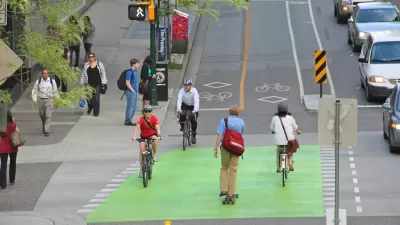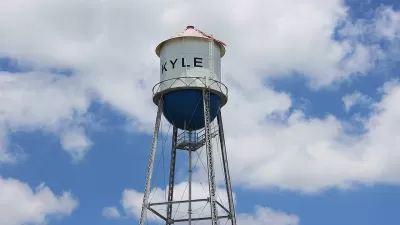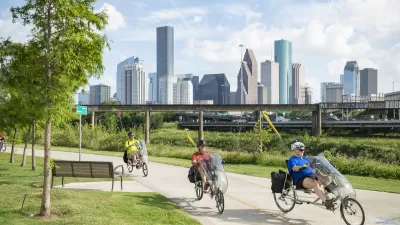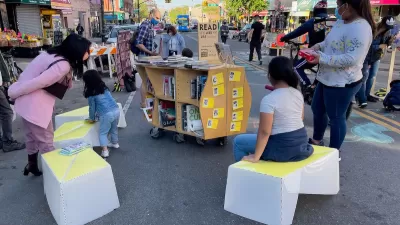Douglas Hausladen, New Haven’s transportation director, envisions building complete streets quickly through a fail-fast approach.

Faced with a long queue of complete streets projects and the prospect of implementing only one a year, Hausladen imagines a different way. Called Complete Streets 2.0, the project will substantially reduce costs by "failing often" via impermanent changes to street space.
Existing roads will be modified to better serve the needs of pedestrians, bicyclists, and buses. "That sounds like a major project, but by doing the job with paint, delineator tubes, and traffic bollards—rather than hard-engineered curbing—[Hausladen] says it can be done for less than $80,000."
If they fail to deliver desirable effects, New Haven can simply reverse the changes. Eric Jaffe reports that amateur "experimental urbanists" already apply extralegal fixes to the urban fabric. Hausladen wants to try out similar approaches officially.
While temporary road markers lack aesthetic appeal, surpassing theory and actually building complete streets might help the model spread.
FULL STORY: The Next Generation of Complete Streets Is Unfolding in New Haven

Alabama: Trump Terminates Settlements for Black Communities Harmed By Raw Sewage
Trump deemed the landmark civil rights agreement “illegal DEI and environmental justice policy.”

Study: Maui’s Plan to Convert Vacation Rentals to Long-Term Housing Could Cause Nearly $1 Billion Economic Loss
The plan would reduce visitor accommodation by 25% resulting in 1,900 jobs lost.

Why Should We Subsidize Public Transportation?
Many public transit agencies face financial stress due to rising costs, declining fare revenue, and declining subsidies. Transit advocates must provide a strong business case for increasing public transit funding.

Wind Energy on the Rise Despite Federal Policy Reversal
The Trump administration is revoking federal support for renewable energy, but demand for new projects continues unabated.

Passengers Flock to Caltrain After Electrification
The new electric trains are running faster and more reliably, leading to strong ridership growth on the Bay Area rail system.

Texas Churches Rally Behind ‘Yes in God’s Back Yard’ Legislation
Religious leaders want the state to reduce zoning regulations to streamline leasing church-owned land to housing developers.
Urban Design for Planners 1: Software Tools
This six-course series explores essential urban design concepts using open source software and equips planners with the tools they need to participate fully in the urban design process.
Planning for Universal Design
Learn the tools for implementing Universal Design in planning regulations.
Caltrans
Smith Gee Studio
Institute for Housing and Urban Development Studies (IHS)
City of Grandview
Harvard GSD Executive Education
Toledo-Lucas County Plan Commissions
Salt Lake City
NYU Wagner Graduate School of Public Service





























